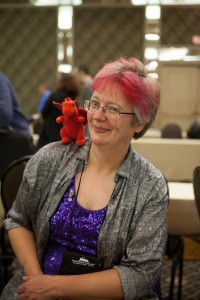
The story’s set in a fantasy version of the complex I live in, which has been FRAUGHT with HO meeting woes that I will not get into here. It’s the result of sitting at many meetings thinking about how much more interesting it would be to live in Villa Encantada, a similar condo complex filled with witches, retired gods, defunct oracles, and even a centaur. Hopefully there will be more set in the same setting.
The story’s also dependent on a secondary frame story,, which I’m not sure about. Here’s the beginning:
The cats were telling stories, from their spaces in the Game, scattered around the sun-baked parking lot of the Villa Encantada complex.
A grizzled Siamese had grabbed control of the telling. He licked his haunches and said, Once upon a time there was a woman who could not forgive herself. Every day she tried to kill herself in the smallest of ways, with cigarettes and lack of sleep and careless driving. She punished herself for a crime she couldn’t name, burning cups of coffee uncushioned by food, high-strung nights of crap television, unsatisfying and numbing all at once.
A tortoise shell spoke from her perch on the arm of a weathered Adirondack chair, a second-story balcony overlooking the way. That’s not how it was.
He blinked, a gesture as majestic as an ice shelf, kilometers high, sliding into the sea.
The tortoiseshell remained undaunted. She continued.
This is how it was.
There’s pieces from the frame used in the actual story itself, which I think makes it feel less superfluous, but I’m also always wary about devices like that. When they work, they’re beautiful – when they don’t, they’re awkward and distracting. So what makes one frame “work” where the next one doesn’t?
Making the frame a story in and of itself is something that often works. If you want to see a book that is concocted of nothing but frame stories, look to Catherynne M. Valente’s The Orphan’s Tales: In the Night Garden (The Orphan’s Tales: In the Cities of Coin and Spice and Kindle version). Valente weaves frames in and out of each other so deftly that she constructs a beautiful basketwork ball of them, a construction where, following one line, you slip into another, and another, then somehow find yourself back in the beginning, with nothing but the world changed.
Other considerations for frame tales: they should be (in my opinion and perhaps not yours but who knows, feel free to chime in with a comment) as well-written as the content they contain. They should be connected somehow, so there’s a reason for the frame tale, something it contributes to the overall shape of the story.
For example, in Villa Encantada, the tortoiseshell cat appears in the story as well, and it becomes, through the interjection of the frame, her story, the story of her efforts in the Great Game played by the cats of Villa Encantada. And then I twist that again in the ending, but I won’t spoil that. :p
So, to recap, frame stories should be:
- actual stories (or contain the sense of a larger story) in themselves
- beautifully written
- connect with the internal story and change its meaning
Anything else? What are your favorite frame stories and why? What have you tried with them and what’s worked best (or worst)?










2 Responses
What are the norms of copyright of web content? How’s it different from Patent?
Copyright protects an artistic work; patents protect inventions.